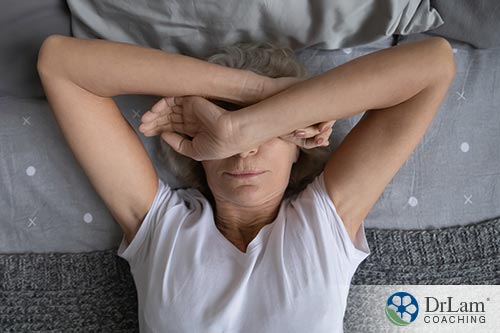 Sleep is incredibly important. Without adequate sleep, you’ll feel fatigued and foggy. You’ll have trouble concentrating and performing daily activities. Sleep maintenance insomnia is one of the most common sleeping problems, therefore learning strategies to overcome it are essential if you want to live a happy and healthy life.
Sleep is incredibly important. Without adequate sleep, you’ll feel fatigued and foggy. You’ll have trouble concentrating and performing daily activities. Sleep maintenance insomnia is one of the most common sleeping problems, therefore learning strategies to overcome it are essential if you want to live a happy and healthy life.
There are many different types of insomnia. Sleep maintenance insomnia is one of the most common types of sleeping problems. When you experience this sleeping disorder, you have difficulty staying asleep. You might fall asleep early but then wake up in the middle of the night and have trouble getting back to sleep.
Occasionally waking in the middle of the night is fairly normal. Some people wake up to 20 times an hour without even realizing it. But if you wake up and then struggle to get back to sleep, then you may have sleep maintenance insomnia. This problem affects around one in five Americans and it’s more common in women than in men.
Missing a little sleep now and then may not sound that dangerous. But the truth is that sleep is more important than most people realize. Sleep maintenance insomnia and other sleeping problems are associated with problems and diseases like:
For these reasons, it's incredibly important that you find strategies that help alleviate your sleeping problems.
If you have sleep maintenance insomnia, then you need to try strategies to overcome it. This can be a very frustrating process. What works for someone else probably won’t work for you, so be patient and prepare to experiment. It’s also important that you don’t try something once and then give up because it doesn’t work. Overcoming sleeping problems isn’t an exact science, so you may have to try things several times or in specific combinations to get the results you’re looking for.
Here are some effective strategies to try:
Most people tend to watch television until it’s time to go to bed. The light and stimulation from the television can leave you feeling wide awake and unable to settle down. The blue light from TVs, cell phones, and computer screens can suppress melatonin, leading to further insomnia. So, if you have sleep maintenance insomnia, then turn off the television and try something more relaxing such as:
Your bedroom environment is incredibly important. It can make you feel relaxed and at ease or stimulate your senses. Use light-blocking curtains and remove any source of light in the room such as a phone or TV. Keep the temperature at a comfortable level and block out external noises where possible. This room is your sanctuary, so design it for optimum sleep.
Don’t have an alarm clock within reach. If you can’t sleep, you’ll probably end up watching it when you can’t sleep. And that can make it even harder to sleep.
Obviously, you need to relax before you go to bed. There are several practices such as yoga, meditation, or progressive muscle relaxation that can help with that. So, try them out and see what leaves you feeling floaty and ready to sleep.
 You should avoid all stimulants before bedtime. This means avoiding caffeine after noon and limiting your alcohol intake at night to a single drink a few hours before bed. Smoking too is a stimulant and can interfere with your sleeping patterns.
You should avoid all stimulants before bedtime. This means avoiding caffeine after noon and limiting your alcohol intake at night to a single drink a few hours before bed. Smoking too is a stimulant and can interfere with your sleeping patterns.
When you have sleep maintenance insomnia, it can be tempting to sleep longer in the morning and make up for the lost hours. You might even be tempted to take naps. Try to avoid this as much as possible as it will just throw off your sleep cycle further. Set a regular waking time and stick to it and try to avoid naps as much as possible.
Sometimes, your sleeping problems may be due to chronic health conditions or symptoms. If pain or discomfort is keeping you awake, visit your doctor to find solutions.
You need to learn to be more in tune with the messages your body is sending you. There’s no point in going to bed if you aren’t sleepy or staying in bed if you’re wide awake. So, listen to your body. Do something relaxing if you aren’t feeling sleepy at bedtime instead of trying to force sleep. And if you’re lying in bed wide awake then get up and do something quiet until you feel sleepy again.
You should be doing some gentle exercise every day. This will tire out your body and encourage better sleep. Just avoid doing it late at night at this will stimulate your body and worsen your sleeping problems.
Ongoing fatigue is one of the most common problems that Adrenal Fatigue Syndrome (AFS) sufferers experience. Often this is due to a combination of factors including poor sleeping patterns such as those that occur with sleep maintenance insomnia.
When you have AFS, the core of this fatigue is due to chronic stress, which causes an ongoing high demand for cortisol. Cortisol is an essential hormone when you’re under stress. It basically wakes up your body and prepares you to respond to a threat by activating the NeuroEndoMetabolic (NEM) stress response. This is the system that works to protect your body against the damage that stress can do and causes the fight or flight response.
Unfortunately, stress is often chronic in the modern world because of a variety of factors such as a poor diet, sedentary lifestyle, mental and emotional stressors, poor health, and detrimental working habits. But the body isn’t designed to cope with this type of ongoing stress. It causes an ongoing high demand for cortisol, which puts pressure on the adrenal glands. And when the adrenal glands start to fatigue because of that demand, AFS and widespread circuit imbalances can be the result.
The Neuroaffect Circuit is one of the body’s interconnected circuits that can become unbalanced when you have AFS. There are 3 systems within this circuit, each of them essential for handling stress. Unfortunately, because they’re so interconnected, these systems can become unbalanced and start to malfunction when you have AFS. And poor health in one system in the circuit will degrade the health of the other organs or systems as well, creating a downward spiral of poor health and malfunction.
The Neuroaffect Circuit consists of the brain, microbiome, and the autonomic nervous system (ANS) and it’s responsible for the biological aspects of any mental health concerns or problems. Adequate sleep is essential for both the health of this system and for overall health. When you have AFS, your body is flooded with the Neurotransmitters (NT) norepinephrine and epinephrine. This is caused by the overactivation of the ANS and by the imbalances in that system that occur as a result of AFS. These NTs are basically stimulants that prepare your body to respond to stress by fighting or running. But when you’re trying to sleep, they will keep you awake and jittery, waiting for a threat that doesn’t appear.
Whether you have sleep-maintenance insomnia or another type of sleeping problem, it can be a vicious circle when you have AFS. The NTs will make it hard for you to get to sleep and stay asleep. The sleep deprivation that results will increase your stress levels, exacerbating your AFS and increasing cortisol levels. This will further unbalance the Neuroaffect Circuit, increase the release of NTs, and worsen the sleeping problems.
Imbalances in other hormones will also affect your sleeping patterns too. Cortisol affects the production and functioning of Melatonin and DHEA, both of which are essential for sleep. NTs also impact the biological clock, which regulates the body’s rhythms, including the circadian rhythm. So, NT imbalances can cause the biological clock to malfunction, affecting your sleeping patterns. And conversely, if your biological clock is disrupted, NT imbalances will worsen, causing more stress and further impacting your sleeping patterns.
This is a tangled knot of malfunction, imbalances, and declining health. It can be very difficult for someone who isn’t a medical professional to identify and implement effective recovery strategies. That’s why it’s important that you get advice and help from a medical professional who’s aware of AFS and the effects it can have on your sleeping patterns and your health as a whole.
Sleep maintenance insomnia might seem like something you just have to put up with. Often, sleeping problems seem to be part of the busy modern lifestyle. But thinking this way is a mistake that could have a detrimental impact on every aspect of your life. That’s why you need to identify strategies to reduce or eliminate sleeping problems such as:

If you have insomnia and are worried about how it will impact your AFS, then contact the team at +1-626-571-1234 or click here to use the Ask The Doctor System.
© Copyright 2021 Michael Lam, M.D. All Rights Reserved.
Sleep maintenance insomnia might seem like a consequence of living a busy life that you just must tolerate. But this couldn’t be further from the truth. In fact, there are lots of strategies that can encourage better and more natural sleep.
